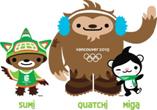
Unregistrable
Gold Medal®
The 2010 Vancouver Winter Olympics are well underway as I write this month’s column. Amidst the uneven weather and conditions on the slopes at Whistler and Cypress Mountain and even some indoor venues, the athletes of this “Olympiad” have once again delivered their usual assortment of remarkable thrills, chills, and spills, gluing us to our TV sets, and provoking the reflexive puzzlement over why we completely ignore these riveting and mind-blowing sports at all other times. But whether it’s the quality of the broadcasts (and NBC has done a terrific job of capturing and condensing the drama for its nightly prime-time broadcasts) or the joy that comes from reacquainting ourselves with events and athletes who, like old friends, return after a long absence, there’s no denying that the Olympic Games occupy a special place in our collective psyche. No doubt the athletic prowess of the competitors who endure unimaginable sacrifices to reach the pinnacle of sport largely accounts for our quadrennial love affair with the luge, the half-pipe, the short-track, and the Super G. (At all other times, “Super G” connotes an upscale supermarket in the DC suburbs. During the Olympic fortnight, that mundane association is eclipsed by the blur of world-class skiers defying sanity and the laws of nature as they attack the treacherous slopes with reckless abandon.) And let’s not forget curling, the sport that lets anyone who has ever nudged a shuffleboard puck or pushed a broom dare to dream that he or she too could someday be an Olympian.
But being a trademark maven, I like to think that intellectual property plays at least a supporting role in nurturing our enduring affinity for the Games. First and foremost, there’s the Olympic symbol—

—whose interlocking rings represent the unity of the five inhabited continents. Created in 1914, its colors—blue, yellow, black, green, and red—were chosen because the flag of every participating country at the time featured at least one of them. This simple, elegant icon eloquently and effortlessly expresses the essence of the Olympic movement. It is only fitting that the Olympic rings rank among the most admired and instantly recognizable symbols in the world. Elevating its significance and stature even further, the Olympic symbol is even protected by its own statute in the United States. It’s so vital to the Olympic experience that one of the key conditions of being awarded the right to host the 2010 Winter Games was a commitment to the International Olympic Committee (“IOC”) that the Olympic brand would be protected in Canada.
Not to be left out of the Olympic IP equation is copyright. What would the Olympic television experience be without the Olympic themes? Leo Arnaud’s “Bugler’s Dream”—with an opening timpani cadence full of portent followed by a majestic brass fanfare—is the most famous. ABC first used it in broadcasts for the 1964 Olympics, and NBC has continued that tradition. For viewers of a certain age, hearing the anthem’s strains conjures waves of memories, from graceful Peggy Fleming earning Olympic gold in 1968, and dashing skier Jean-Claude Killy dominating the slopes that same year, to The Miracle on Ice at the 1980 Lake Placid Games, when the U.S. men’s ice hockey team made up of amateur collegiate players defeated the supposedly invincible Soviet team, going on to defeat Sweden for the gold medal. And since the 1984 Games, an alternative theme, a bright, invigorating fanfare composed by Academy Award® winner John Williams, has added to the Game’s sonic landscape.
Last, and perhaps least, have been the Olympic mascots. Each year since 1972, the Games have featured a mascot, usually a whimsical character that supposedly reflects or embodies some aspect of the host country’s cultural heritage. Few have been memorable, most were forgettable, and some have been downright weird. Take, for example, the mascots for the 2004 Summer Games in Athens:

Maybe its just me, but it’s hard to envision that a duo resembling twin homunculi would have much marketing cache. Perhaps the trio of mascots for Vancouver will fare better than the Athens twins:

But don’t hold your breath until the 2012 London Games, where another iconic anthem undoubtedly will figure prominently in the network’s promotional runup—The Clash’s “London Calling.”